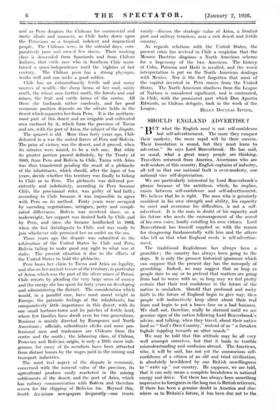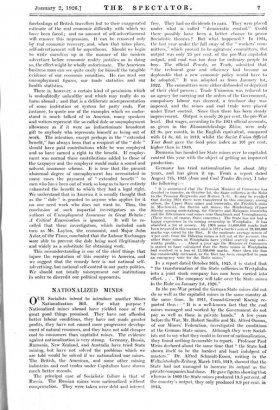SHOULD ENGLAND ADVERTISE?
"BUT what the Engligh need is not self-confidence but self-advertisement. The more they conquer. their modesty, the more rapid will be their success.' Their foundation is sound, but they must learn to advertise." So says Lord Beaverbrook. He has said,' as usual, what a great many people are thinking., Travellers returned from America, Americans who are well-wishers of this country, English captains of industry, all tell us that our national fault is over-modesty, our national vice self-depreciation.
We are particularly interested by Lord Beaverbrook's phrase because of the antithesis which, he implies, exists between self-confidence and self-advertisement. We believe that he is right. The man who is genuinely confident in his own strength and ability, his capacity to meet and overcome his difficulties, is not a self- advertiser. It is the man in doubt of his capacity and his future who needs the encouragement of the sound of his own voice, loudly extolling his own virtues. Lord Beaverbrook has himself supplied us with the reason for disagreeing fundamentally with him and the others who tell us that what England needs is self-advertise- ment.
The traditional Englishman has always been a grumbler ; the country has always been going to the dogs. It is only the grossest historical ignorance which can suppose that the present day has the monopoly Of, grumbling. Indeed, we may suggest that so long as people dare to say or to pretend that matters are going from bad to worse with us, so long may we feel pretty certain that their real confidence in the future of the nation is unshaken. Should that profound and rocky faith in the future of England begin to give way, then people will instinctively keep silent about their real fears and begin to put a brave face on .a bad business. We shall not, therefore, really be alarmed until we see genuine signs of the nation following Lord Beaverbrook's advice, and talking, when they travel, about their native land as "God's Own Country," instead of as "a forsaken foghole toppling towards an utter smash."
We may be told that this attitude may be all very well amongst ourselves, but that it leads to terrible misunderstanding and confusion abroad. The American, who, it. will be said, has not yet the unconscious self- confidence of a citizen of an old and tried civilization, is absolutely bewildered by our British unwillingness to "write up" our country. He supposes, we are told, that it can only 'mean a complete breakdown in national energy and drive. Yet there has always been something impressive to foreigners in the long run in British reticence. If there has been a genuine doubt in Atherica and else- Where as to Britain's future, it has been due not to the - forebodings of British travellers but to their exaggerated estimate of the real economic difficulty with which we have been faced ; and no amount of self-advertisement will remove this impression. It can be removed only by real economic recovery, and, when that takes place, .self-advertisement will be superfluous. Should we begin to write ourselves up in the manner of the modern advertiser before economic reality justifies us in doing so, the effect might be wholly unfortunate. The American business man can see quite easily for himself the tangible evidence of our economic condition. Ile can read our funemployment figures, our trade statistics and our iiealth statistics.
There is, however, a certain kind of pessimism which is undoubtedly unhealthy and which may really do us harm abroad ; and that is a deliberate misrepresentation Of some institution or system for party ends. For instance, to quote one of the examples which we under- 'stand is much talked of in America, many speakers and writers represent the so-called dole or unemployment allowance as if it were an indiscriminate broadcast gift to anybody who represents himself as being out of Work. The intention, except perhaps in the "extended benefit," has always been that a recipient of the " dole " should have paid contributions while he was employed and so have earned a right to the benefit. If employ- Ment was normal these contributions added to those of the taxpayer and the employer would make a sound and 'Isolvent insurance scheme. It is true that the present 'abnormal degree of unemployment has necessitated in 'many cases the payment of "extended benefit" to men who have been out of work so long as to have entirely exhausted the benefit to which they had a legal right. We understand that in America it is usually thought that as the " dole " is granted to anyone. who applies for it no one need work who does not want to. Thus, the conclusion of such impartial investigators as the authors of Unemployment Insurance in Great Britain : A Critical Examination is ignored. It will be re- called that these investigators, which included such men as Mr. Layton, the economist, and Major John Astor, of the Times, concluded that the Labour Exchanges were able to prevent the dole being used illegitimately and widely as a substitute for obtaining work.
This misunderstanding is one of the chief things that injure the reputation of this country in America, and we suggest that the remedy here is not national self- advertising, but national self-control in our party politics. We should not totally misrepresent our institutions order to discredit our political opponents.











































 Previous page
Previous page